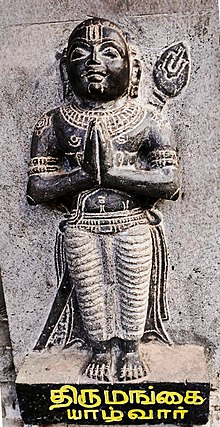Thirumangai Alvar | |
|---|---|
 | |
| Personal | |
| Born | Kaliyan the 8th century CE (traditional dating: 2702 BCE)[1] Kuriayalur (Thiruvali-Thirunagari) |
| Died | Thirukkurungudi (Thirunelveli dist.) |
| Religion | Hinduism |
| Other names | Parakalan |
| Organization | |
| Philosophy | Vaishnava Bhakti |
| Religious career | |
| Literary works | Periya Tirumoli Tirunetuntantakam Tirukkuruntantakam Tiruvelukkutrirukkai Ciriya Tirumatal Periya Tirumatal |
| Part of a series on |
| Vaishnavism |
|---|
 |
Thirumangai Alvar (IAST:Tirumaṅgai Āḻvār ), also referred to as Thirumangai Mannan[2] is the last of the 12 Alvar saints of south India, who are known for their affiliation to the Vaishnava tradition of Hinduism. He is considered one of the most learned Alvars, and the most superior Alvar in the context of composition of verses.[3] He holds the title Narkavi Perumal, the mark of an excellent poet,[3] and Parakala (Beyond Time).
Though he is respected as a Vaishnava saint-poet, he was born as a Kshatriya[4] and initially worked as a military commander under the cholas,[5] a chieftain, and then a robber. After his conversion to Vaishnavism, he confronted practitioners the sect of Shaivism, as well as Buddhism and Jainism.
- ^ Sakkottai Krishnaswami Aiyangar (1911). Ancient India: Collected Essays on the Literary and Political History of Southern India. Asian Educational Services. pp. 403–404, 409. ISBN 9788120618503.
- ^ Cite error: The named reference
Subramanianwas invoked but never defined (see the help page). - ^ a b Pillai 1994, pp. 192–4
- ^ Seshadri, Kandadai (1996). "Ramanuja: Social Influence of His Life and Teaching". Economic and Political Weekly. 31 (5): 292–298. ISSN 0012-9976. JSTOR 4403749.
- ^ Harle, James C. (1963). "Durga, Goddess of Victory". Artibus Asiae. 26 (3/4): 237–246. doi:10.2307/3248984. JSTOR 3248984.